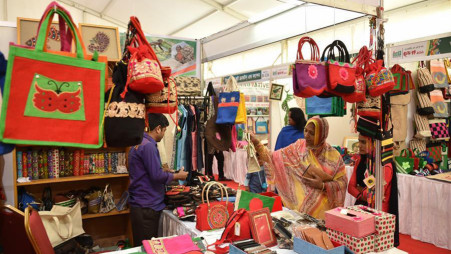New SME policy to cover AI, subcontracting opportunity for small entrepreneurs: Industry secretary

Industries Secretary Md Obaidur Rahman has said the draft of the "National SME Industrial Policy 2025" has been finalised and that a comprehensive policy has been prepared incorporating all possible facilities for the cottage, micro, small and medium enterprise (CMSME) sector.
He made these remarks today (29 September) while speaking as the chief guest at a focus group discussion titled "Branding and Marketing Challenges for CMSMEs: Unlocking Exports Potential," organised by the Dhaka Chamber of Commerce and Industry (DCCI).
"This policy gives priority to entrepreneurs. Many new issues have been included, such as the use of artificial intelligence and opportunities for small entrepreneurs to engage in subcontracting," Obaidur Rahman said, adding that the policy will be placed before the cabinet next week.
Obaidur Rahman added, "The garments sector has progressed a lot, but we still haven't built a single global brand. We are basically doing a tailor's job—importing fabric and making products according to buyers' requirements for export."

He also spoke about the role of Bangladeshi missions' commercial counsellors in branding abroad. The secretary said, "Except in a few countries, they hardly do any work. Their role in branding Bangladeshi products overseas needs to be strengthened."
DCCI President Taskeen Ahmed said that despite having strong potential, the country's CMSMEs are failing to succeed in exports due to various complications. He said the sector suffers from limited access to finance and markets, inadequate infrastructure, a complex regulatory environment and lagging technology adoption.
According to the DCCI president, export failures stem from a mix of internal, external and relationship factors. "Internally," he said, "major obstacles include a lack of branding knowledge, weak market research, gaps in digital marketing and poor product positioning. Externally, cumbersome customs procedures, barriers to online payments, logistics shortages and unstable trade policies make exports even more difficult."
Taskeen added, "There are also weaknesses in relationships—for example, failure to select the right importers, lack of trust-building and insufficient regular, effective communication with international buyers—all of which contribute to export failures."
He further noted that structural imbalances—such as over-dependence on financial assistance, absence of comprehensive databases, weak market linkages and gaps in technology adoption—are preventing the CMSME sector from progressing sustainably.



 Keep updated, follow The Business Standard's Google news channel
Keep updated, follow The Business Standard's Google news channel
















